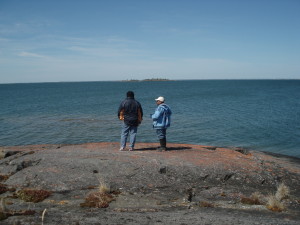Western Tour: Yellowknife – No Ice on the Big Water
Yellowknife is on the northern shore of Great Slave Lake. Known as Tu Cho, or “Big Water” in Dene, it is the deepest lake in North America at 614 m, and the ninth-largest lake in the world, covering 27,200 km².
Today Dene Nation members Fred Sangris and Lee Mandeville took us out on the lake, or at least a tiny corner of it. Although it is common for the lake to be covered with ice at this time of year, this spring it melted around the beginning of June — almost a month ahead of schedule. Climate change?
It took just under 45 minutes to travel about 15 km to a lovely island covered in birch and stunted spruce, lichens, moss, flowers and even wild onions. The moss was dry and crunched beneath our feet. Lee said that was unusual for this early in the season. There hasn’t been a good rain in a long time and people are worried about forest fires and another lean berry harvest.
Fred’s fishing plans were spoiled by strong winds, but he came prepared with whitefish, muskrat, and caribou ribs for the cookout. As we savoured the “country food” Fred and Lee talked about how the rapidly declining caribou herds are causing stress in the communities.
Caribou is a staple food for the Dene, and an important source of protein in a part of the world where a package of four pork chops can cost $20. Fred said one caribou can feed a family of five for almost a month, and most families can’t afford and don’t want to replace that with meat from the grocery store.
Almost exactly four years ago, in June 2006, KAIROS and the Akaitcho Dene co-hosted the Tu Cho International Indigenous Water Rights Conference (click here to view a PDF version of the conference report). Protecting Indigenous water rights was the theme and people came from throughout the entire “Big Water” watershed to talk about how to keep the water clean and safe for future generations. While there wasn’t much talk about “climate change” four years ago, the conference declaration did acknowledge the stories that were shared about the interconnectedness of all things, and about the impact of global trends on local waters:
We have seen and heard stories over the last two days about the sickness of the earth and know from our first hand experience, our Elders’ traditional knowledge, and our allies’ scientific knowledge, that our waters are not well.




